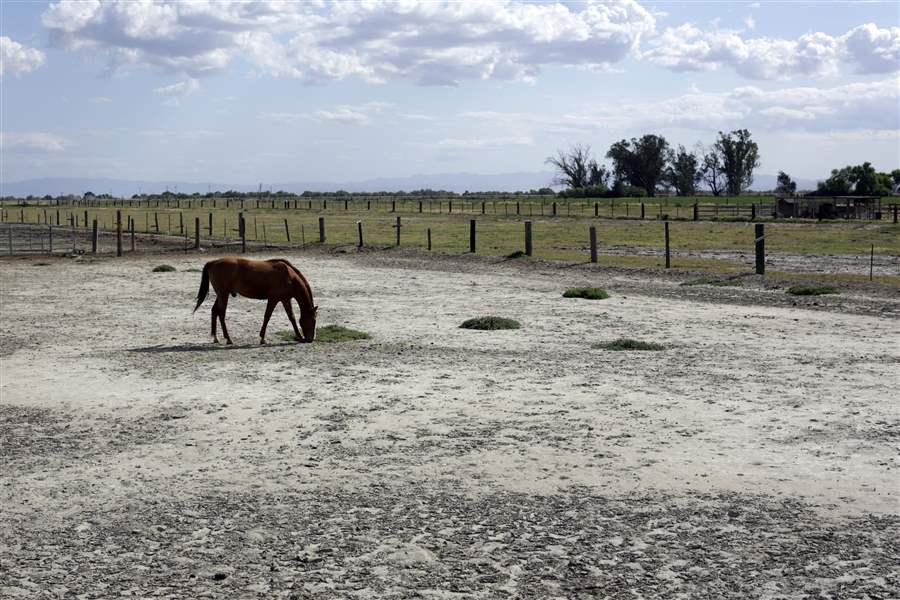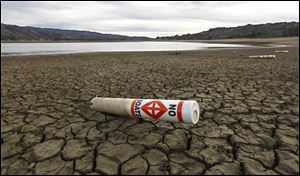
DESPERATELY DRY
Drought heats up water sales in parched California valley
7/5/2014
A horse grazes at a ranch near Merced, Calif. As drought has deepened in the last few months, a handful of special districts in the state’s agricultural heartland have made millions through auctions of their private, underground caches that go to the highest bidders.
ASSOCIATED PRESS

A horse grazes at a ranch near Merced, Calif. As drought has deepened in the last few months, a handful of special districts in the state’s agricultural heartland have made millions through auctions of their private, underground caches that go to the highest bidders.
SAN FRANCISCO — Throughout California’s desperately dry Central Valley, those with water to spare are cashing in.
As a third parched summer forces farmers to fallow fields and lay off workers, two water districts and a pair of landowners in the heart of the state’s farmland are making millions of dollars by auctioning off their private caches.
Nearly 40 others also are seeking to sell their surplus water this year, according to state and federal records.
Economists say it’s been decades since the water market has been this hot. In the last five years alone, the price has grown tenfold to as much as $2,200 an acre-foot — enough to cover a football field with a foot of water.
Unlike the previous drought in 2009, the state has been hands-off, letting the market set the price even though severe shortages prompted a statewide drought emergency declaration this year.
Private water sales are becoming more common in states that have been hit by drought, including Texas and Colorado.
In California, the sellers include those who hold claims on water that date back a century, private firms who are extracting groundwater and landowners who stored water when it was plentiful in underground caverns known as water banks.
“This year the market is unbelievable,” said Thomas Grecie, the general manager of the Madera Irrigation District, which recently made nearly $7 million from selling about 3,200 acre-feet. “And this is a way to pay our bills.”

A warning buoy sits on the dry, cracked bed of Lake Mendocino near Ukiah, Calif. Competition for water in California is heightened by the state’s geography: The north has the water resources, but the biggest water consumers are to the south.
All of the district’s water went to farms; the city of Santa Barbara, which has its own water shortages, was outbid.
The prices are so high in some rural pockets that water auctions have become a spectacle.
One agricultural water district amid the almond orchards and derrick fields northwest of Bakersfield recently announced it would sell off extra water it acquired through a more than century-old right to use flows from the Kern River.
Local TV crews and journalists flocked to the district’s office in February to watch as manager Maurice Etchechury unveiled bids enclosed in about 50 sealed envelopes before the cameras.
“Now everyone’s mad at me saying I increased the price of water. I didn’t do it, the weather did it,” said Mr. Etchechury, who manages the Buena Vista Water Storage District, which netted about $13.5 million from the auction of 12,000 acre-feet of water.
Competition for water in California is heightened by the state’s geography: The north has the water resources, but the biggest water consumers are to the south, including most of the country’s produce crops.
The amount shipped south through a network of pumps, pipes, and aqueducts is limited by the drought and legal restrictions on pumping to save a threatened fish.
During the last drought, the state Department of Water Resources ran a drought water bank, which helped broker deals between those who were short of water and those who had plenty. But several environmental groups sued, alleging the state failed to comply with the California Environmental Quality Act in approving the sales, and won.
This year, the state is standing aside, saying buyers and sellers have not asked for the state’s help. “We think that buyers and sellers can negotiate their own deals better than the state,” said Nancy Quan, a supervising engineer with the department.